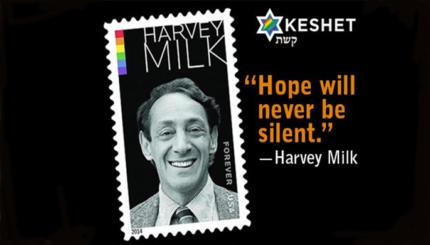Given the rise of today’s growing youth-led LGBTQ movements, there seems to be a divide between where we have been and where we find ourselves now — a divide growing deeper by the decade. The melding of intergenerational history has been sorely lacking from my perspective as a rising activist, and I see great value in connecting the dots, learning from the movements that came before us, and re-contextualizing history.
Which is how I wound up engaged in a delightful chat with Shelly Weiss, a self-defined queer, Jewish, genderfluid lifelong political activist from a working-class background and the founder of OUTmedia. OUTmedia’s motto is “Changing the World One Act at a Time,” and it works to use the arts as a vehicle for societal and systemic change. Seventy percent of OUTmedia’s work involving live performances is staged on college campuses, which Shelly called “the next frontier” when OUTmedia started in 1994. (In fact, Keshet is co-sponsoring with Hillel and OUTmedia a national campus comedy tour featuring the riotous Julie Goldman this fall.)
In between heartwarming moments of poignancy and laughter with Shelly, I was learning how to build a movement from the ground up (or build several); what solidarity means (hint: it’s uncomfortable); and all about her hearty, bawdy vision for the future.
So, diving in, tell me about how you grew up. What was going on in the world at the time, and how might that have influenced your trajectory?
I’m 68, and I was born in 1946 at the end of the war. I grew up in the Brownsville neighborhood in Brooklyn, New York, the daughter of a factory worker, who worked in 200-degree heat blocking “ladies” hats, and a homemaker, in a neighborhood that was largely working class and Jewish. By the time this baby boomer was in fourth grade, I began to notice some things that were happening in my neighborhood. There was a flight of Jews leaving the community as more and more African=American and Puerto Rican people moved into the neighborhood. Because we were economically challenged, we remained in the building with 40 apartments, and were one of four remaining Jewish families while the rest of the building were people of color.
And I began to learn some things about race.
I began to really question the nature of how it was important for Jews to look towards those principles of tikkun olam and the desire to change the world. I evolved into someone who wanted to, as a Jew, fight the racism I was seeing in my own community. So by 1963 I was actually there for Martin Luther King, Jr’s speech in Washington, DC. However, attendance at a march 52 years ago doesn’t grant me a pass to not commit to work on fighting systemic racism now.
What happened when you started college? For me, moving away to independently learn and grow inspired my education around radicalism.
In the United States it was a time of possibilities of empowerment, the Peace Corps, the idea of the importance of moving towards civil rights, including voting rights, the Black Power Movement, and the ascendancy of Martin Luther King, Jr. So to me it was a very elevated time, but we were also so immersed in this senseless war in Vietnam.
And it was at that point when I really became radicalized.
I remember going to Washington, DC with a sociology professor and a bunch of students from Brooklyn, Boston, and Philadelphia to speak to Robert Kennedy. We were protesting the bombing of Haiphong Harbor. That’s where I moved to in my senior year, and at the end of that year I went to an amazing conference of activists around country who were organizing around the hopes that anti-war candidate Eugene McCarthy would run for president. That’s an evolution that happened in college.
I wasn’t “out” at that point. I came out in 1971, at a time when I knew no gay people. Not one single gay person.
That’s incredible. So then how did that ultimately happen for you?
I actually came out with another woman who, like me, identified as straight. And it was kind of really interesting in that we had become friends and would often go cruising for men together, and we realized that we were who we were looking for. It was totally unexpected. It was a time — mind you, I don’t think I’ve shaved my legs since 1971 — but we even bonded because we had shaving scars at the same location on our legs.

In 1970, I left living with my parents and moved to Park Slope in Brooklyn. There were cool, political people, many of whom were artists, people who were edgy, a place where you could feel strongly the rumblings of the women’s movement and the sexual liberation movement. To me that led to a time where I could really break out of the rules of my mother, so to speak, and really find myself.
I have often been credited with being the first “out” lesbian in Park Slope. Now this is simply not true. There were Native Americans doing it thousands of years ago, yet somehow I had gained this reputation.
I think what it really meant was that I was the first lesbian in many straight people’s lives who was very natural about talking very openly about who I was.
Like this post?
- Join the conversation through MyJewishLearning’s weekly blogs newsletter.
- Get breaking LGBTQ Jewish news, resources, and inspiration from Keshet in your inbox!
- Learn more about OUTmedia.
- Visit the OUTmedia tumblr www.news.OUTmedia.org.

